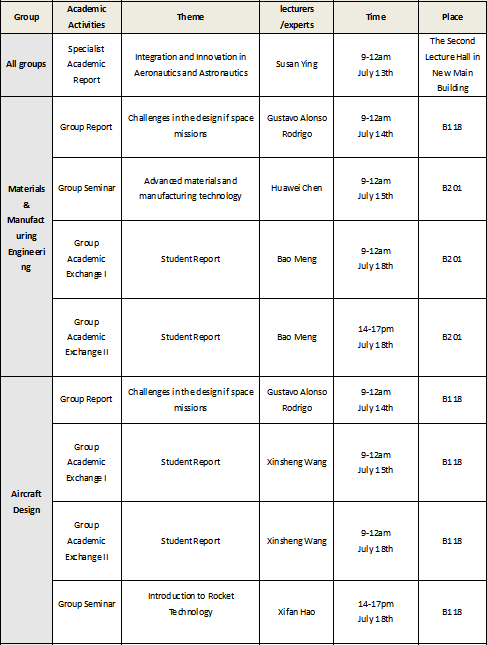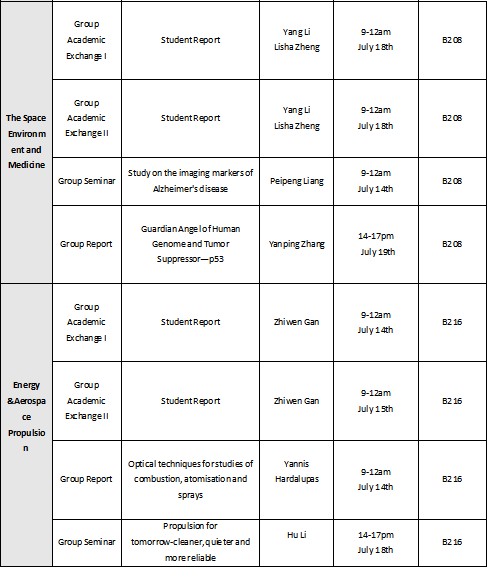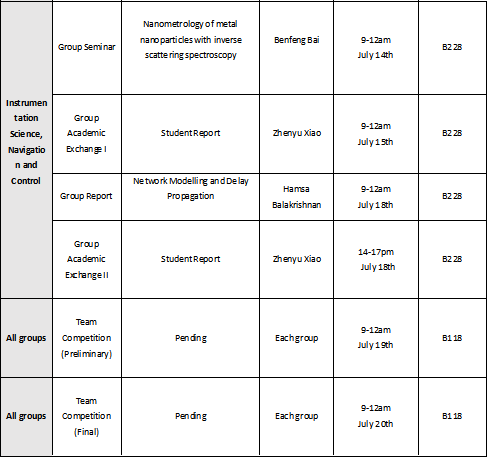各位老师���,同学���:
2016年凯时KB88国际研究生暑期学校将于2016年7月13日至20日在我校学院路校区举行���,届时���,59名国外著名高校研究生和我校60名研究生将共同开展各类学术和文化交流活动。
暑期学校学员根据专业和研究方向分为五个班���,邀请了16名国内外相关领域的专家���、教授为暑期学校作学术报告���、点评学员报告并研讨学术热点问题。
本届国际暑期学校的所有学术活动面向全校师生开放���,现将报告���、交流和研讨的详细安排及专家���、教授的简介附后���,欢迎感兴趣的老师和同学前来参加。
研究生院
2016年7月11日
1 Brief Introduction to Academic Events
The participants will be divided into five groups according to their majors and research fields.?
(1)Lectures
Each group will attend two lectures given by experts in their research areas.
(2) Academic Exchanges
a) Four sessions for five groups will be organized in parallel. Each student is required to give an oral report of around 15 minutes.
b) Academic discussions will be held among professors of relevant laboratories at BUAA and the participants.
(3) Technical Tours
Lab A. State Key Laboratory of ATC New Navigation System
Lab B. The State Key Laboratory for Virtual Reality Technology and System
Lab C. Robot Research Institute
Lab D. Integrative Experimental Facility “Lunar Palace 1” for Permanent Astrobase Life-support Artificial Closed Ecosystem (P.A.L.A.C.E) Research
Lab E. Beijing Key Laboratory for Cooperative Vehicle Infrastructure Systems and Safety Control
Lab F. Key Laboratory of Spacecraft Design Optimization and Dynamic Simulation, Ministry of Education
(4) Team Competition
This summer school aims to introduce science and technology frontiers of aeronautics and astronautics to the participants. The organizing committee of the summer school will put forward a frontier problem for each group (this time the problem for each group is the same), and members of the group will be divided into teams to do research and write a research report, on which experts will comment. Several distinguished teams will win the Best Team Award.
The competition theme of each group is: Interdisciplinarity, collaboration and innovation in Aerospace study.
2 Detailed Arrangements:



3 Introduction to Experts Invited
●Dr. Susan Ying
With 30 years of experience in the aerospace industry, Dr. Ying has been a leader, engineer, professor, and aviatrix passionately in pursuit of aerospace challenges. Ying is the Chief Integration Officer of the Commercial Aircraft Corporation of China.?
Prior to her current position, Ying retired from the Boeing Company as Director of the Boeing Research and Technology organization. Ying’s other roles at Boeing included Director of Engineering and Information Technology, Enabling Technology Program Manager, Executive Program Integration for Phantom Works, leadership positions in the C-17 Extended Range Program, Systems Engineering and Integration, Aerodynamics, and Flight Performance for Advanced Transport Technologies. Demonstrating success both at individual and team levels, she has been the recipient of many honors, including the Asian American Engineer of the Year Award, Boeing C-17 Silver Eagles Award, and NASA Group Achievement Award. Before joining Boeing, Ying taught at universities and directed research in the DOE Research Labs and NASA Ames Research Center; and earned a spot as a NASA Astronaut Candidate finalist.?
Dr. Ying is a Fellow of the AIAA. She serves as the VP-International leading the AIAA International Activities Committee and as a member on the Board of Directors. She also serves in ICAS as an Executive Committee member. Ying has co-chaired the only joint AIAA–China Atmospheric Flight Mechanics Conference in Xian, China. She also represented US university professors as the Aerospace Education Ambassador to Russia. Ying holds a commercial pilot license and is a FAA-Certified Flight Instructor. She received her PHD in Aeronautics and Astronautics from Stanford University, and took executive education training from the Kellogg School of Business Administration, Wharton Business School, and Brookings Institute in Brussels.
●Prof. Yannis Hardalupas
Professor Yannis Hardalupas graduated from National Technical University of Athens in Greece with a degree in Mechanical Engineering in 1984 and received his PhD degree from the Mechanical Engineering Department at Imperial College in 1989, where he was appointed Professor of Multiphase Flows in 2009. He was awarded an EPSRC Advanced Research Fellowship on experimental research on combustion of liquid and solid fuels and an industrial secondment to Ricardo Consulting Engineers from the Royal Academy of Engineering for development of computational models for atomization of liquid fuels in IC engines. He is currently the chair of the Committee of the Combustion Physics group of the Institute of Physics and secretary of the British Section of the Combustion Institute and member of the technical committee of Propellants and Combustion of the American Institute of Aeronautics and Astronautics and the Editorial board of the International Journal of Spray and Combustion Dynamics, Experiments in Fluids and the Journal of Combustion and the Advisory Board of several International Conferences. In addition to his contributions in the area of combustion, liquid atomization and sprays, the development of novel optical techniques has led to patents for novel instruments on powder sizing, planar droplet sizing and nanoparticle sizing.
●Prof. Hamsa Balakrishnan
Hari Balakrishnan is an associate professor of Aeronautics and Astronautics at the Massachusetts Institute of Technology (MIT). Her current research interests are in the design, analysis, and implementation of control and optimization algorithms for large-scale cyber-physical infrastructures, with an emphasis on air transportation systems. These include airport congestion control algorithms, air traffic routing and airspace resource allocation methods, machine learning for weather forecasts and flight delay prediction, and methods to mitigate environmental impacts. Her research spans theory and practice, including both algorithm development and real-world field tests.
●Prof. Hu Li
Professor Hu Li is an expert in the combustion and emissions from internal combustion engines and vehicles and have many years’ research experience in transport emissions, air pollution, alternative fuels, lubricants, energy management. And currently, he is an associate professor at School of Chemical and Process Engineering, University of Leeds, focusing on research of Energy and carbon auditing and management, Combustion and emissions from spark Ignition, diesel and gas turbine engine engines, Real world vehicle emissions measurement and modelling, and Biofuels for road and air transportation.
Professional Engagement:
●Chartered Energy Engineer; Member of Energy Institute
●Member of the Society of Automotive Engineers International
●Member of Institute of Vehicle Engineers
●Member of Combustion Institute
●Invited Expert for EU-PEMS NRMM Pilot Program (EU Portable Emission Measurement System for Non-Road Mobile Machinery) by European Commission Enterprise and Industry Directorate-General, Brussels [Dr Li is the only invited expert from academia involved in this programme.]
●Member of Coal, Biomass & Alternative Fuels (CBAF) committee of ASME IGTI (American Society of Mechanical Engineers International Gas Turbine Institute).
●Independent Peer Reviewer for the Global Atmosphere R&D Programme of the DEFRA Science Quality and Priorities Team.
●Member of editorial board for the International Journal of Traffic and Transportation Engineering published by Scientific & Academic Publishing (SAP).
●Prof. Gustavo Alonso Rodrigo
Professor Gustavo Alonso Rodrigo is the Deputy Director of the Faculty of Aerospace Engineering (ETSIA/UPM) from Technical University of Madrid. He has participated in about thirty research projects funded by public institutions (EU, Spanish government) and private companies, resulting in the publication of more than 25 papers in indexed journals and 40 presentations in international conferences. Prof. Gustavo Alonso Rodrigo are mainly engaged in the research of spacecraft system design and spacecraft thermal analysis and design, and also has a close cooperation with the School of Astronautics, Beihang University.
●Dr. Yanping Zhang
Dr. Yanping Zhang is currently a tenured Professor in the Department of Radiation Oncology and Lineberger Comprehensive Cancer Center, the University of North Carolina in Chapel Hill. Dr. Zhang received his B.S. in Microbiology and M.S. in Virology from Fudan University at Shanghai, China, and Ph.D in Molecular Biology from the University of Nebraska at Lincoln, Nebraska, USA. He received post-graduate training at the University of North Carolina in Chapel Hill. He became a faculty member of the Department of Molecular Oncology at the M. D. Anderson Cancer Center in 2001. He moved to UNC Chapel Hill in 2004.
Dr. Zhang has received many awards in recognition of his achievements including the Howard Temin Award, the Burroughs Wellcome Fund Career Award, the M.D. Anderson Research Trust Award, UNC Junior Research Fellow Award, Leukemia & Lymphoma Society Scholar Award, American Cancer Society Research Scholar Award, the UNC Jefferson-Pilot Award, and the Battle Distinguished Cancer Research Award. Dr. Zhang’s research focuses on the molecular mechanisms and the genetics underlying the pathogenesis of human cancer as well as in modeling cancer in vivo in model systems such as the mouse. His work attempts to understand the complex networks of tumor suppressor p53 that are involved in many essential functions in tumor suppression, to identify specific molecules that affect communication between cellular activities that make up these networks, and to understand how these molecules are regulated under both normal and stressful conditions. These studies have significant implications for the understanding and management of human diseases including cancer.
●Xifan Hao
Xifan Hao, assistant dean of CALT and academician of IAA, graduate from Beihang University at 1985 and CALT at 1988. He has been engaged in the research and the development of rocket technology. When serving as a director in COSTIND, He organized the research of lunar exploration. After the implementation of CLEP, he worked as the director of Lunar Exploration Engineering Center Deputy and then as the deputy chief designer of CLEP Phase III.
●Dr. Benfeng Bai
Dr. Bai, associate professor from the Department of Precision Instrument, dedicated to studies on the micro&nano optical including Plasmonics, chiral metamaterials, Diffraction grating and nanometrology. He is also the peer reviewer of several international journals in the field of physics and optics such as The Optical Society of America, Opt. Lett., Opt. Express, Appl. Opt. and so on.
Education experience:
2001–2006, Doctor of Optical Engineering, Tsinghua University;
1997–2001, Bachelor of Precision instrument and Measurement & Control Technology, Tsinghua University.
Work experience:
2009–, associate professor of Department of precision instruments, Tsinghua University;
2009, Post doctor of Academy of Finland, University of Joensuu;
2006–2008���,Post doctor, University of Joensuu.
●Dr. Peipeng Liang
Dr. Liang���,post doctor���,associate professor of Xuanwu Hospital of Capital University of Medical Sciences and deputy director of Beijing Key Lab of MRI and Brain Informatics. He is a member of Society of Molecular Imaging of Chinese Society of Radiology (CSR) and Society of Radiology of Beijing Medical Association. His research field is medical imaging and Cognitive neuroscience. Research orientation includes Multimodality Imaging of Neurodegenerative Diseases, Cognitive Neural Mechanism of Human Inductive Reasoning and the application of Human brain atlas.
●Prof. Huawei Chen
Professor Chen, born in April 1975, Professor of Department of Mechanical Engineering and Automation, Beihang University. A senior member of Chinese mechanical engineering society, a member of ASME, the bionic engineering society, Japan mechanical engineering society, a senator of University of Wollongong doctoral dissertation, visiting professor of Tokyo Institute of Technology, national security technology consulting experts, Beijing distinguished expert. He graduated from Tokyo Institute of Technology, Japan in 2005. He got his doctorate in mechanical and physical engineering. He has made a number of innovations on bionic functional surface research, micro and nano-fabrication technology, theory of micro flow behavior of liquid surface and so on. He is the first author and corresponding author in China who published the first paper in mechanical engineering discipline on Nature ,which is regarded to achieve a major breakthrough of fundamental research in the Chinese University mechanical engineering discipline.
●Prof. Zhiwen Gan
Professor Gan’s research field is alternative aviation fuel, combustion and multiphase dynamics. He received his Bachelor degree of engineering in Engineering Physics in Tsinghua University and received his Master degree of engineering in Engineering Themophysics in Beihang University. In 2012, he graduated from Nanyang Technological University and received his Ph.D. degree.
●Prof. Yang Li
Dr. Yang Li, associate professor of Department of Automation, Beihang University, doctoral supervisor. He conducts his research in pattern recognition and intelligent system laboratory from February, 2013. Dr. Li Yang is mainly engaged in the research of complex system modeling and biomedical signal processing, machine learning, medical image data analysis and processing. The main research methods include EEG (EEG), functional magnetic resonance imaging (fMRI), as well as pattern recognition and machine learning and other methods of calculation and analysis.
●Prof. Lisha Zheng
Dr. Lisha Zheng, associate professor of Department of Biological and Medical Engineering, Beihang University. She graduated from Department of biochemistry and molecular biology, Institute of Biophysics in 2008. She mainly works in the study of the mechanical and structural biology and enzyme kinetics in tissue regeneration, especially in bone and oral cavity.
●Prof. Bao Meng
Dr. Bao Meng, born in September 1985, associate professor of Department of Mechanical Engineering and Automation, Beihang University. Graduated from Department of mechanical engineering and Automation of Beihang University in 2014. He was an associate professor at Hong Kong Polytech University from 2014 to 2015. He has made a number of innovations in micro and nano scale ductile fracture, advanced plastic forming technology and equipment technology.
●Dr. Xinsheng Wang
Lecturer of Department of Astronautics, Beihang University. He worked at the China Academy of Space, Shenzhen Institute of Aerospace Science and Technology Innovation from 2001 to 2005. He has engaged in the development of multiple types of star load computer, design and software development of on-board electronic system, research of control system semi physical simulation technology, research of micro satellite overall integration technology and automation testing technology and other aspects of the technical work.
●Dr. Zhenyu Xiao
Dr. Zhenyu Xiao, received his bachelor degree in Department of Electronic and Information Engineering of Huazhong University of Science and Technology in 2006 and received his doctor degree in Department of Electronic Engineering of Tsinghua University in 2011. He engaged in postdoctoral work in the Department of Electronic Engineering at Tsinghua University from 2011 to 2013. He has been working as a lecturer in Beihang University since September 2013.
His Professional Orientation:
●Beamforming for Antenna Array
●Beamforming Training
●MIMO Beamforming
●Packet Arrival Detection
●Digital Compensation for Non-Ideal RF
编辑���:孙也程